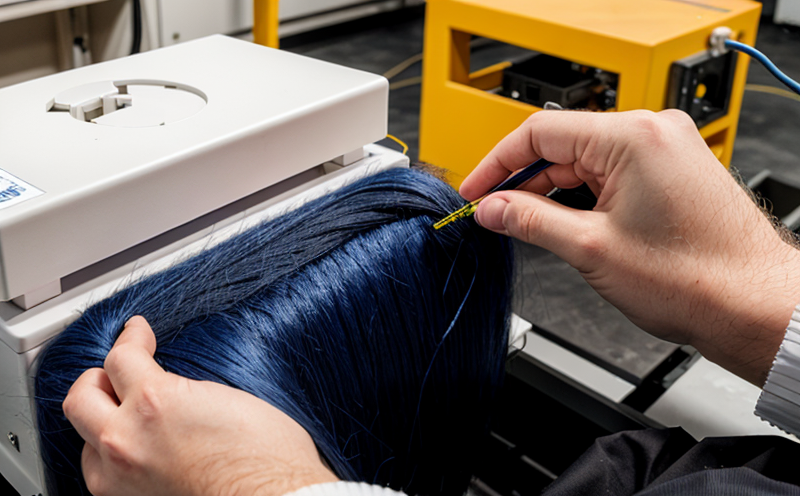CSA D276 Identification of Textile Fibers Using Microscopy and Solubility Tests
The Canadian Standards Association (CSA) Z10-98, also known as CSA D276, provides a standardized method for identifying textile fibers using microscopy and solubility tests. This service is crucial in various industries including fashion, home textiles, and industrial materials where the composition of fibers can significantly influence product quality, performance, and compliance with regulatory standards.
The test procedure involves two primary methods: microscopic examination and solubility analysis. Microscopy allows for the observation of fiber morphology under a microscope, which is essential in distinguishing between similar-looking fibers like rayon and cotton. Solubility tests involve immersing samples in specific reagents to determine if they dissolve or precipitate based on their chemical composition. This helps identify synthetic from natural fibers.
For accurate identification, the testing process requires meticulous sample preparation. Samples are cut into small pieces of approximately 2-3 mm for microscopy and prepared according to solubility test protocols. The choice of reagents used in solubility tests is critical as it must be compatible with a wide range of fibers without causing damage or altering their properties.
The analytical instruments required include optical microscopes, polarizing microscopes, and various chemical reagents like sodium hydroxide, nitric acid, perchloric acid, and dimethylformamide. These tools ensure that the samples are examined under controlled conditions to minimize errors in identification.
CSA D276 is widely recognized for its reliability and accuracy in fiber identification. The test results provide a detailed report indicating the types of fibers present along with their percentage composition. This information is invaluable for quality control, ensuring compliance with textile industry standards such as ASTM D1412-08 or ISO 9050:2013.
Proper interpretation of microscopic images and solubility results requires expertise in fiber science. Our experienced team uses advanced imaging techniques and analytical software to enhance the precision of identification. This service ensures that clients receive accurate, reproducible test results which are essential for maintaining product integrity and meeting regulatory requirements.
The importance of CSA D276 cannot be overstated. It helps manufacturers ensure the authenticity of their products by verifying fiber content claims. For example, in the fashion industry, knowing whether a garment contains the specified fibers ensures brand reputation and customer trust. In industrial applications, such accuracy is vital for selecting appropriate materials that meet performance demands.
- Microscopy: Provides visual evidence of fiber morphology.
- Solubility Tests: Distinguishes between natural and synthetic fibers through chemical reagents.
- Sample Preparation: Ensures consistent results by standardizing sample size and condition.
- Analytical Instruments: Advanced equipment like optical microscopes and polarimeters are used for accurate analysis.
- Chemical Reagents: Specific reagents tailored to dissolve or precipitate different types of fibers.
- Reporting: Comprehensive reports detailing the composition and identification process.
In summary, CSA D276 is a robust method for identifying textile fibers. Its application across various sectors ensures that manufacturers can produce high-quality products that meet both internal standards and external regulations. By leveraging this service, businesses enhance their competitive edge by maintaining product authenticity and consistency.
Industry Applications
The identification of textile fibers using CSA D276 is not limited to a single industry but has broad applications across numerous sectors:
- Fashion Industry: Ensures the authenticity of clothing and accessories, supporting brand integrity.
- Home Textiles: Guarantees the quality of carpets, curtains, and bedding materials.
- Textile Manufacturing: Facilitates the selection of appropriate raw materials for production processes.
- Sports Apparel: Validates the use of specific fibers to enhance performance and durability.
- Medical Textiles: Ensures that medical garments meet stringent quality standards.
- Automotive Industry: Enables the use of suitable materials for seat covers, upholstery, and other interior components.
In each of these industries, accurate fiber identification is critical to maintaining product quality and meeting consumer expectations. By adhering to CSA D276 standards, manufacturers can ensure that their products are reliable and consistent in terms of composition and performance.
Eurolab Advantages
At Eurolab, we pride ourselves on providing unparalleled service excellence when it comes to textile fiber identification using CSA D276. Our advantages include:
- Expertise: Our team consists of highly trained professionals with extensive experience in fiber science.
- State-of-the-Art Facilities: Equipped with the latest analytical instruments and software for precise identification.
- Comprehensive Reporting: Detailed reports that provide a comprehensive overview of the testing process and results.
- Rapid Turnaround Times: Efficiently deliver results to meet tight deadlines without compromising on accuracy.
- Regulatory Compliance: Ensures compliance with international standards such as ASTM D1412-08 and ISO 9050:2013.
- Certified Analysts: Our analysts are certified by relevant bodies, ensuring the highest level of expertise.
Our commitment to excellence is reflected in every aspect of our service. By choosing Eurolab for your textile fiber identification needs, you can rest assured that you receive accurate and reliable results.





